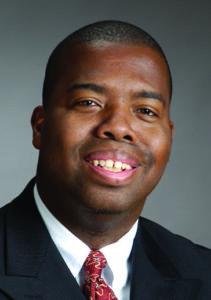As a writer, there are some stories that I cannot believe I get to lend my voice to the narrative. However, over the years, I have learned to be honest with myself when it comes to the issue of race and culture.
If you were to look at my friend base, you would discover that I love having a diverse circle of friends; in fact, this diversity has shaped everything about me throughout the years. I have chosen to live out the principle of diverse church ministry, I have had the privilege of serving in both majority Black and white church contexts and even worship at a multiethnic church in my hometown, outside Atlanta.

Maina Mwaura
I love diverse ministry and believe it is something God has called for us to do; however, I am having a Nathaniel moment in my life and ministry. Nathaniel was one of the 12 disciples, and although we don’t know a lot about him, we do know from the words of Jesus that he was an honest man in assessing Jesus and his culture.
The Nathaniel moment originated in John 1:45. In this Gospel, John writes a beautiful passage in which Jesus gathers the greatest team the world has ever witnessed, the 12 disciples. In this passage, Nathaniel poses to Jesus an honest question that perhaps the best of us should be asking ourselves if we, like Nathaniel, desire to live authentically in a multiethnic world.
With that in mind, here are five reasons to avoid multiethnic ministry:
First, the numbers are against us. Barna Research, along with Lifeway Research, have concluded that still two generations after the advent of the Civil Rights Movement, American churchgoers do not want to talk about race.
Many pastors have decided that it is not even important enough to teach. The numbers just are not on our side if we are going to bring about multiculturalism within our churches. As leaders, we have to know that talking about it will step on toes.
If you are someone who considers the way the wind is blowing before you make a decision, you should avoid this area. I am thankful that Jesus decided to avoid this stance; in fact, he does everything in his ministry to challenge the cultural norms of his day. During Jesus’ earthly ministry, the numbers weren’t on his side either when it came to popular opinion on culture and race, but he decided public opinion wasn’t going to stop him in showing what heaven is going to look like.
“If you are someone who considers the way the wind is blowing before you make a decision, you should avoid this area.”
Second, it is uncomfortable. This past week I received a phone call from a friend who has decided to live in the multiethnic lane. He strives to live out his ministry challenging the majority culture that he is part of to embrace diversity. The structure he is part of has pushed back and asked him to stop talking about race. In the Christian school where he serves, many of the parents have felt uncomfortable about his conversations and the public stance he has made.
As I listened to my friend share his heart, I could not help but think about the interaction Nathaniel had with Jesus: “Does anything good come from Nazareth?” Most of us would admit that is an uncomfortable question. It is even offensive.
If we are going to embrace multiethnic ministry, there will be uncomfortable times. If we are not willing to be uncomfortable, it may not be best for our churches to embrace multiculturalism.
Third, new people may want to join in. Before you start thinking I have gone off the deep end, let me say I love welcoming new people into the local church, even more so if they are people who want to start a relationship with Jesus.
“The goal of the local church should not be making people from diverse cultures assimilate to the majority culture, which may rob them of their own cultural identity.”
However, anytime new people join any organization, change inevitably will happen, especially if people are coming from other cultures. The goal of the local church should not be making people from diverse cultures assimilate to the majority culture, which may rob them of their own cultural identity.
I have heard a million times that God does not see culture and we are all one race, which is true. Yet God is an artist. God celebrates each beautiful skin tone and culture because God is the one who has made man in God’s own image.
If a church is going to embrace multiculturalism, they are going to need to embrace a cultural identity as a complement to their churches, not a threat.
Fourth, how are you with money? Now, before you think this is a Dave Ramsey seminar, it is not. However, financial issues may arise, in fact they will arise.
It is widely known that anytime new races and cultures join an organization, finances will change. It also is widely known that people of color in America generally don’t have the same income levels Caucasians do, so their giving levels may not be the same — even if non-white members give higher percentages of income.
It is also reality in churches that those who give the most money often assume — even if not saying so out loud — that their opinions should matter more than others when key decisions are made. That is a barrier to multiculturalism.
My friend Mark Hearns, pastor at First Baptist Church of Duluth, Ga., recently shared with me that when he decided to move his majority-culture church toward diversity, he knew he would have to tackle financial issues first. He knew some people would inevitably leave the church over this change, which is what they did — and took their money with them.
“Being debt-free meant there would not be financial pressure to oppose diversity by withholding giving.”
In being a good steward, this pastor decided he would meet with the top-tier givers first to offer a heads-up about what was coming and to ask them to buy into change. He also decided the church would pay off any lingering debt it carried so the congregation would be freely capable in moving toward diversity.
Being debt-free meant there would not be financial pressure to oppose diversity by withholding giving. How we steward God’s resources always matters. This is why leaders should know what they are up against financially before embracing multiculturalism.
Fifth, you will make mistakes. In a culture where cameras are everywhere, let us be honest. Sometimes there is a genuine fear of not wanting to say or do the wrong thing. Anytime we take a risk, we have to know there is a possibility we may not get it right.
This is why we have to establish relationships with people outside of our own race who will hold us accountable and call us out when we fail. If you are not willing to be accountable to people outside your race, you should not do multicultural ministry.
Leaders are human. Mistakes will — not may— be made. God values people. God wants us to live in accountability to people from all walks of the cultural spectrum.
I love the interaction between Jesus and Nathaniel. When confronted by Nathaniel, Jesus is clear that he values honesty even when it comes to cultural issues. And I believe within the body of Christ we have to be honest with one another if we are going to tackle cultural issues while the world is watching the church closer than ever before.
Maina Mwaura is a freelance writer and communications consultant who lives in the metro Atlanta area. A native of Orlando, Fla., he earned a bachelor of science degree in communications from Liberty University and a master of divinity degree from New Orleans Baptist Theological Seminary.
Related articles:
Contrary to what you’ve heard, study finds churches thrive with racial diversity
More churches defined as racially diverse but that doesn’t lead to racial justice work
Study: church diversity does not guarantee diverse thinking, beliefs
Pastors say worship makes difference in multiethnic congregations


